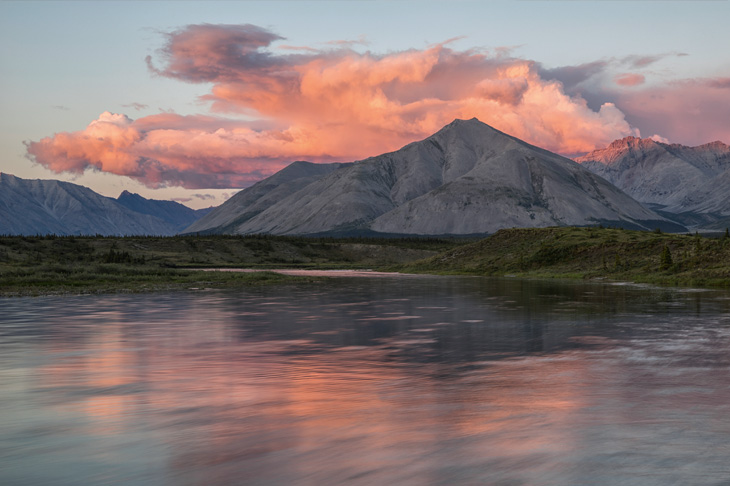‘Help!’ I thought, when I read the Author’s Note. ‘It’s about salmon, and I hate fishing.’ But by the first page I was hooked. Adam Weymouth writes well. He is poetic, but also precise.
His subject is the return of the ‘king’ salmon to their birthplace and final destination, the north ridge of McNeil Lake in Canada.
These fish are many pounds of muscle, toned from years of swimming headlong into Pacific storms, and their flesh is as red as blood. They force against the Yukon’s current, shouldering their way upriver, setting their fins like sails. Eventually they will push thousands of miles into North America’s interior. They will reach mountain lakes; they will reach the clouds.
Weymouth canoes along the Yukon — at almost 2,000 miles, the longest salmon run in the world — starting at McNeil Lake (the salmon that return there will have travelled further than any on the planet) and ending at the Bering Sea.
On his four-month odyssey (his Swedish girlfriend joins him) he meets a varied cast, all intimately involved with the salmon, some descended from ancient tribes. One such is Percy Henry, a Tr’ondëk Hwëch’in ‘elder’, one of two surviving speakers of the Hän language. Weymouth writes: ‘Before 1897, life had not changed significantly for the Tr’ondëk Hwëch’in for several thousand years.’ In 1896, gold was found, and within three years, around 100,000 prospectors came to the region — the Klondike Gold Rush. For the first time, ‘the flesh of the Yukon king was given monetary value when it was sold in camps. Many men had arrived, woefully unprepared, and many were starving to death.’
Weymouth meets the 89-year-old Percy in Dawson City — present population 1,375. During the Gold Rush, it had escalated from 5,000 to 40,000 in a single year. Today, oil is the draw. Percy grieves that
In Alberta they’re squeezing oil out of the sand. Now they’ve poisoned the big river. The sea is dying. When you see those big whales come ashore to die you know there’s trouble. They got no place to go. I shouldn’t just say white people, but they cause a lot of trouble. The dollar comes before anything. The fish didn’t change. We change.
Weymouth is too intelligent to write a simple critique of humans tampering with nature. But one can’t help drawing conclusions from his interviewees about greed, stupidity and unnecessary interference.
Stan, originally a gang member in Boston, came to the Yukon in 1970, aged 20. He describes the fish wheel, a device long used by biologists to study salmon. A 2007 study showed that those fish that had ‘spent time incarcerated had a reduced migration rate and were more likely to be recaptured further upriver, disoriented, injured, sometimes dying’. Stan designed a more humane version, but fell foul of the Alaska Department of Fish & Game. The state refused to use his figures. The ADF&G established rules to prevent overfishing but, according to fluctuations in the number of fish each year, had to keep altering them. Even before ‘outsiders’ got involved, historically there were bad years. After its blanket fishing bans in 2014 and 2015, the ADF&G has tried to let people fish for themselves, while remaining conservation-minded. As Weymouth admits: ‘No one is pretending that managing salmon is simple.’
This is a rich and fascinating book. We learn that grizzlies sometimes mate with polar bears; that America bought Alaska from Russia in 1867; that salmon definitely feel fear and pain; and that Scottish salmon farmers have increased their use of chemicals. Dickens, writing in 1861 on ‘Salmon in Danger’, claimed that early in the 19th century, the fish sold in Billingsgate market were caught only a few miles from London Bridge — 3,000 salmon a year — but within 25 years the Thames was empty, as a result of the Industrial Revolution. And Weymouth’s terrific account of the 2009 flood, caused by the break-up of ice in the Yukon, is so vivid it reads like a thriller. But I did wish for a better map.
I shall let Stan have the last word. ‘When the world comes to an end, the fish will recover just fine.’






Comments